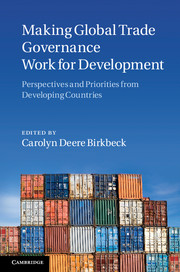 Making Global Trade Governance Work for Development
Making Global Trade Governance Work for Development Book contents
- Frontmatter
- Contents
- Figures
- Tables and boxes
- Contributors
- Acknowledgements
- Introduction
- Part I Global trade governance
- Part II Roles and responsibilities in global trade governance: diversity in developing country priorities and strategies
- Part III Strengthening multilateralism
- Part IV Making WTO negotiations and decision-making processes fairer
- 16 Towards fair and inclusive decision-making in WTO negotiations
- 17 Revisiting the single undertaking
- 18 Enhancing developing country participation in global trade governance through South–South coalitions in the WTO
- 19 Inclusive trade governance
- 20 Global trade governance and development
- Part V Conclusion
- Index
- References
16 - Towards fair and inclusive decision-making in WTO negotiations
from Part IV - Making WTO negotiations and decision-making processes fairer
Published online by Cambridge University Press: 07 September 2011
- Frontmatter
- Contents
- Figures
- Tables and boxes
- Contributors
- Acknowledgements
- Introduction
- Part I Global trade governance
- Part II Roles and responsibilities in global trade governance: diversity in developing country priorities and strategies
- Part III Strengthening multilateralism
- Part IV Making WTO negotiations and decision-making processes fairer
- 16 Towards fair and inclusive decision-making in WTO negotiations
- 17 Revisiting the single undertaking
- 18 Enhancing developing country participation in global trade governance through South–South coalitions in the WTO
- 19 Inclusive trade governance
- 20 Global trade governance and development
- Part V Conclusion
- Index
- References
Summary
Negotiating new market access and rules in the World Trade Organization (WTO) has become increasingly complex and difficult. The WTO’s maiden trade round, the Doha Development Agenda (DDA), is today the longest running trade round in the history of multilateral trade negotiations. Prior to the DDA’s launch in November 2001, WTO rule-making was restricted to a handful of plurilateral agreements negotiated among the leading exporters of information technology, telecommunications and financial services. In contrast to the lethargy of the multilateral process, there has been a rapid proliferation of regional trade agreements (RTAs), which undermine the multilateral regime’s non-discriminatory norms.
Several factors, past and present, explain the WTO’s negotiating drift and the deadlock that thwarts the conclusion of the DDA. The history of the General Agreement on Tariffs and Trade (GATT) reflects the marginalization of developing country interests; the assertion by the major economic powers of their own market access interests in foreign markets (a mercantilist approach); and trade protectionism in the major developed country markets (Wilkinson 2006a; Finger 2007). This has resulted in an ‘asymmetry of economic opportunity’ against developing countries and the persistence of unbalanced negotiating texts in favour of developed countries in the GATT up to the Uruguay Round (Wilkinson 2006b). In the current Doha Round, the collapse of several ministerial meetings can be partly attributed to the continuation of this protectionist tendency (Ismail 2009a).
- Type
- Chapter
- Information
- Making Global Trade Governance Work for DevelopmentPerspectives and Priorities from Developing Countries, pp. 461 - 485Publisher: Cambridge University PressPrint publication year: 2011
References
- 4
- Cited by
